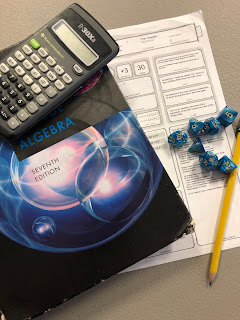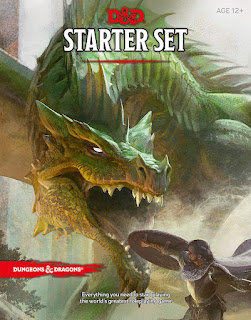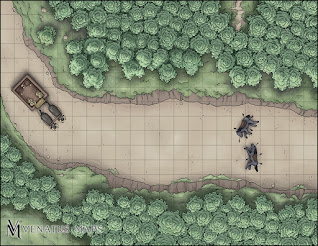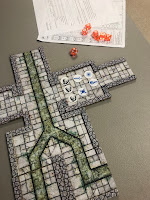So, I finally did it! I had the opportunity and support to start a D&D club at my Middle School building. Now this isn't a big after-school program or anything. This happens during the school day in our "clubs period" every other Tuesday. Joined by my friend and colleague, Jared Reck (read his books!), I ventured to come up with a club that would introduce our students to this awesome hobby.
The Setup
The advertisement we put in our middle school clubs catalog looked like this:D&D is exceptionally inclusive. All you need to join is an imagination. Playing is like creating infinite stories that you and your friends write—and rewrite and re-rewrite—together. You’re all active participants in writing a unique adventure through different, fantastical worlds and scenarios. There is no winner. Instead, the goal is to deepen your understanding of your character by interacting with other players and their shared environment.
Participation in tabletop cooperative role playing games like D&D has been shown to help us develop social skills, prime our brains for interdisciplinary stem learning, and improve our imaginative skills in writing, game design and more. Come join Mr. Walters and Mr. Reck to find out what the big deal is with D&D.
Participation in tabletop cooperative role playing games like D&D has been shown to help us develop social skills, prime our brains for interdisciplinary stem learning, and improve our imaginative skills in writing, game design and more. Come join Mr. Walters and Mr. Reck to find out what the big deal is with D&D.
I probably stole a lot of that from various other sources, but that was months ago, and I can't remember all of my sources (help). I know that some came from this article. Apparently our club catalog description worked because we had a lot of kids sign up!
Our mission for the club included the following tenets:
- It was important to teach kids real D&D 5E so they could most easily join an ongoing game elsewhere. I love me some OSR, and free games like Basic Fantasy, but I wanted to "equip" kids to play the most commonly played version of D&D.
- It was important to have student Dungeon Masters, so they could start their own games.
- It was important to be as inclusive as possible and involve safety tools to make everyone feel good about the game.
- It was important to do this with as many tangible artifacts as possible. Yes, I am a Computer Science Teacher. Yes, both Jared and I do a lot with digital tools when teaching, but we wanted kids to have a non-digital experience with this game.
So, the overall plan was this:
- Give students a taste of basic ttrpg play with a simple Fungeons & Flagons - type scenario.
- Teach kids how to create a real 5th edition Character Sheet using the free Basic Rules from WotC.
- Teach DM's how to DM using The Lost Mine of Phandelver and Professor Dungeon Master's videos & SlyFlourish's videos.
- Go over Safety Tools.
- Get a game going.
Materials: Including Resources for you to steal
Disclaimer: This is certainly possible to do 100% free - ZERO BUDGET! I didn't do that, though. I spent some of my own money to get some things like physical dice and some copies of the "Starter Set" in order to:- Save us some effort up front and
- Give the students the full experience (there's something about rolling real dice).
The D&D Starter set
I know. I know. I've stated here numerous times how much I love The Essentials Kit, and it is by-far my favorite. It's the one I tell my students to buy to start their adventures at home, but the Starter Set has the following advantages:
- It goes on sale for $6.00 on Amazon at Christmas (and is normally 12 bucks). Either way, that's cheap.
- The included adventure, "The Lost Mine of Phandelver", includes in-line instructions to help DM's learn the game.
- Mike Shea, AKA Slyflourish, has an entire Youtube playlist dedicated to helping DM's prep and run "The Lost Mine of Phandelver".
The Dice
Again, I went to Amazon for this one. I know that I have encouraged you to support your FLGS, and I still do. However, when starting a club at school, it's hard to argue with 25 sets of dice for $26.99.
I also bought some zip-lock sandwich bags at Aldi, which work great to hold each individual set. I placed them in an old K-Cup box, and Voila, instant dice storage and organization!!
As promised, Resources to steal.
So I collected and created a lot of handy resources for this show, some of which are digital (like slide presentations), but most of which are printable. Feel free to steal these and edit for your own needs. Lets spread this fine hobby to students all around.
Intro to D&D - First day.
- Presentation
- My favorite Character Sheets (both using fonts I absolutely hate - so you know they're good if I'm still linking to them!)
- Basic Rules PDF can be obtained here.
Safety Tools
- Handout I made from this article by Slyflourish.
Oh it's magic!
Success Stories & Struggles
Jared and I were blown away during our first club session with how excited the students were to create a character or learn the craft of Dungeon Mastery. We had enough students to run three tables, each with their own student Dungeon Master. I rotated among the tables helping Dungeon Masters as they got stuck and Jared sat in as a Player Character, Eleryn Stinkhorn, human cleric.
Unfortunately, we only made it into the first scenario before running out of time (more on this situation below). Then we got a new group. Many of our players returned, but our Dungeon Masters did not. Character creation was a much smoother process this time, but Dungeon Mastery wasn't nearly as smooth, causing me to have to step in and teach the DM that he is, in fact, on the players side. As a part of DM training, I give the following advice from Professor DM:
This is great advice, but in club group two, I learned that this advice needs to be tempered with the advice, "read over the darn adventure before you run it and don't come up with gonzo scenarios to kill players while not letting them do anything".
The problem with schedules & the lack thereof...
The biggest struggle we've had in getting this going has been time. I know, time is always a struggle with D&D. In this context, though, we've never actually made it to the playing phase. I know, that's really lame for a club about playing a game. I have to accept some responsibility on the planning side, but the clubs schedule (actually the lack of a schedule) has been a major hurdle.
Our clubs work on trimesters, and we meet on Tuesdays, every other week, opposite social emotional lessons that we call WEB. The base issue is that this is not very much time before we get a whole new group of kids. The real compounding issue is that the school doesn't stick to its own schedule. Clubs are regularly cancelled and replaced with "bonus" WEB meetings, but it's never done the other way around. We never get a "bonus" club day. Please don't misunderstand my stance. I have nothing against social-emotional learning. In fact, that's the main reason we're doing a D&D club (which is a whole other post in itself). Most often, these "bonus" days have little to do with social emotional learning and everything to do with "we need to hand out these papers and have the kids get this other thing done..." If I had my druthers, we would combine clubs and WEB so that our groups are one and the same. Then, we could move fluently between the two activities. I think our D&D group would build a camaraderie that would allow them to be more open when discussing serious topics.
So, our plan this coming trimester is to skip character creation and jump right into play. I plan to provide "pregens", like those made for the Starter Set. We should have a decent number of returning students, and students who are new will be welcome to come see me during our PM homeroom period to get 1-on-1 help rolling up a character.
What do you think?
My goal here was two-fold. One, I wanted to share the resources we came up with to get folks started, and hopefully make the task of starting a club at your school less daunting. Two, I wanted to hear from those of you who already have something like this up and running. What can we do better? What cool tools / techniques have worked for you. Be sure to comment here or hit us up on the twits, as no one says.







Comments
Post a Comment
Thank you for commenting on my post! I look forward to our conversation!